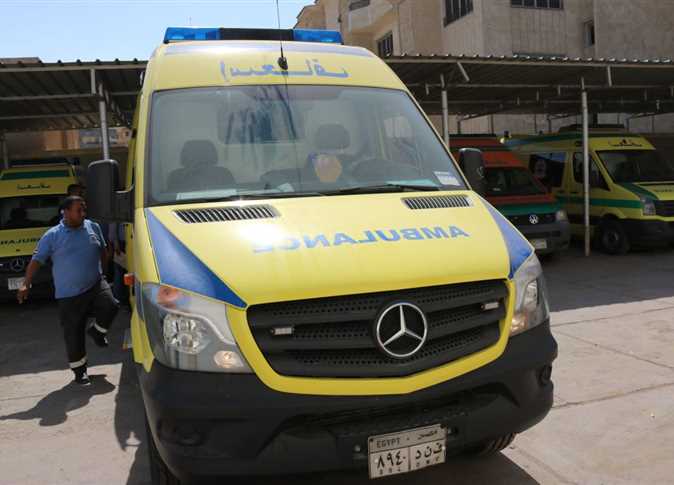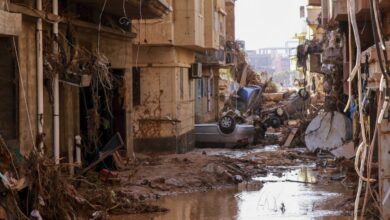State-owned papers focus on President Mubarak’s tour of Beni Suef yesterday. During a press conference open to all residents of Beni Suef Governorate, Mubarak gave a speech outlining his efforts to end unemployment. Under the headline “Government assigned with making unemployment top priority,” Al-Ahram reports on the details of the president’s speech, including his claim that “despite the global financial crisis, we have succeeded in creating 3.4 million jobs in the past four years.”
The president reportedly went on to mention his 2005 campaign promise to create 4.5 million jobs by 2011—a promise he says will be fulfilled by the myriad projects planned for the next year, including 16 “industrial areas” to be created in various governorates across Egypt.
Mubarak also delivered some potentially upsetting news to his audience when he said that upcoming budget cuts will decrease the amounts allotted to individual governorates. Instead, Al-Ahram reports, the money will be redirected to other “priorities.” The paper also includes the president’s comments on the current state of Palestinian affairs, in which he warned that the ongoing disputes between Palestinians could lead to the loss of their land, a result that would only benefit Israel.
In Al-Gomhurriya’s report on Mubarak’s Beni Suef speech, the paper mentions the seven “trade areas” scheduled for various locations throughout Upper Egypt. Al-Gomhurriya’s coverage, and headlines, were identical to Al-Ahram’s. Even less impressive is Al-Akhbar’s coverage of the press conference, which disregards detailed reporting and instead fills its front page with large-font bullet points and a larger image of President Mubarak seemingly aching for a hug.
Al-Ahram also reports that while taking questions from the audience, the president interrupted one man who introduced himself as a Coptic Christian by requesting that the audience member “speak as an Egyptian, not a Muslim or Christian. We are all the sons of one nation. Religion is for God, but this nation is for all.” The man’s response to this request is not reported.
Independent papers are less concerned with Mubarak’s trip to Beni Suef. Al-Wafd focuses on People’s Assembly Street, on which, according to the paper, five separate protests were held yesterday.
Approximately 600 employees of the textile company Amonsito protested outside the parliament. They are angered by their inability to return to work or receive a salary from the company, which was recently seized by Banque Misr for unpaid debts. Also protesting were “tens” of physically-disabled citizens demanding the government provide them with handicap-accessible housing as well as kiosks that would enable them to make a living. Following three days of protesting, the physically-disabled demonstrators will embark on a hunger strike until their demands are met.
Residents of a property located on St. Daniel Street in Alexandria also protested yesterday. They are reportedly angry with a recent decision by Central Alexandrian authorities to tear down their building, which has been condemned and designated as on the verge of collapse. The fourth group of demonstrators consisted of 200 employees of the Nubarian Agricultural Machinery Company, who claim that they have not received salaries for the past two years, since the company has halted production.
The last “group” of protestors consisted of a single individual carrying a sign that read, simply: “No to ElBaradei.” When interviewed, the man blamed the former director of the International Atomic Energy Agency for the United States’ invasion of Iraq, according Al-Wafd.
Al-Shorouq quotes Deputy General Guide of the Muslim Brotherhood Mahmoud Ezzat saying that the Brotherhood would participate in “all the elections,” despite the fact that he and 14 other Brotherhood leaders were recently been arrested by security forces. Ezzat was speaking from the North Cairo courthouse where he and the other members of the organization are awaiting the court’s verdict determining whether or not they would receive a 15 day jail sentence in a case known in the media as “Qutbists.”
Essam el-Erian, one of the arrested Brotherhood Guidance Bureau Members, described the whole case as “a ploy designed by the security forces with the aim of distancing the Brotherhood from the political activism now growing in Egypt following Mohamed ElBaradei’s appearance as a potential presidential candidate.”
Finally, ElBaradei’s recent statement “together we will bring change,” provides the headline for Al-Dostour. “We must unify all the disparate calls for change into a singular framework for a national collective, which I have been asked to be at the head of,” ElBaradei is quoted as saying. The paper also quotes ElBaradei explaining that the “collective” will be open to all Egyptians, both in Egypt and abroad. According to the independent paper, the aim is not only to modify the election process, but to bring about a “comprehensive change.”
Egypt’s newspapers:
Al-Ahram: Daily, state-run, largest distribution in Egypt
Al-Akhbar: Daily, state-run, second to Al-Ahram in institutional size
Al-Gomhorriya: Daily, state-run
Rose el-Youssef: Daily, state-run, close to the National Democratic Party’s Policies Secretariat
Al-Dostour: Daily, privately owned
Al-Shorouq: Daily, privately owned
Al-Wafd: Daily, published by the liberal Wafd Party
Al-Arabi: Weekly, published by the Arab Nasserist party
Youm7: Weekly, privately owned
Sawt el-Umma: Weekly, privately owned




